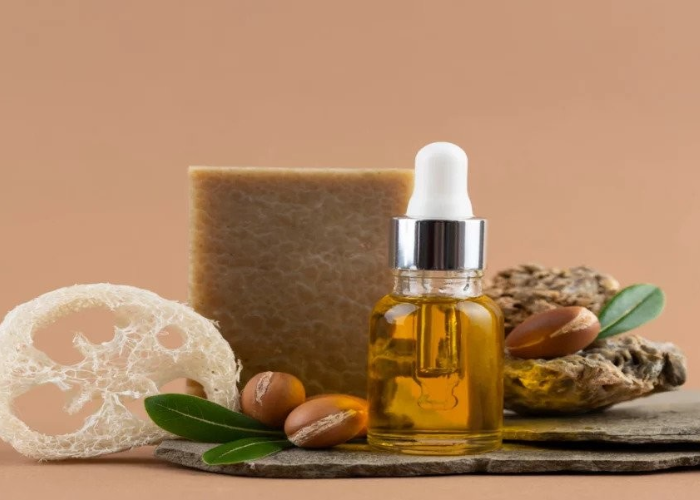The importance of diet for excellent skin care is undeniable and one of the essential ingredients to add to your daily regimen is oil. Oils are an excellent source of antioxidants, fatty acids, and vitamins that help to nourish and protect your skin.
Benefits of Eating a Balanced Diet for Skin Care
A balanced diet is an essential part of skin care. Eating the right foods can help give your skin the nutrients it needs to remain healthy and vibrant. Eating a diet that is rich in vitamins and minerals, such as fruits and vegetables, can help to nourish your skin from the inside out. Fruits and vegetables are packed with antioxidants that help to protect your skin from free radical damage and other environmental stressors. Additionally, eating plenty of lean proteins and healthy fats can help to keep your skin hydrated and supple. Eating a balanced diet also helps to reduce inflammation, which can aggravate existing skin problems like acne and eczema. Lastly, making sure you get enough essential fatty acids like omega-3s can help to keep your skin looking its best. While it may seem simple, eating a balanced diet is essential for excellent skin care.
Different Oils and Their Benefits for Skin Care
A healthy diet is essential for excellent skin care, and oil can be a particularly beneficial ingredient. Different types of oils can be used in skin care, each offering unique benefits. For example, olive oil is rich in vitamins, minerals, and antioxidants, making it great for nourishing and moisturizing the skin. Coconut oil is also highly emollient, which helps to lock moisture in the skin and prevent dryness. Additionally, it has anti-fungal, anti-bacterial, and anti-inflammatory properties that can help to reduce inflammation and minimize breakouts.
Jojoba oil is similar to the natural sebum produced by the skin, so it can be used to replenish and balance oil production, as well as nourish the skin barrier. Lastly, argan oil is high in fatty acids, which helps to keep the skin hydrated and reduce the appearance of wrinkles and fine lines. With the right combination of oils, you can tailor your skin care routine to best suit your individual needs.
How to Incorporate Oils Into Your Diet for Skin Care
When it comes to skin care, oil is an essential ingredient. From providing nourishment to fighting acne and wrinkles, oils have been used for centuries as a natural skin care option. Incorporating oils into your diet is a great way to maintain healthy skin, and with the right knowledge and ingredients, you can reap the many skin benefits that oils offer. To incorporate oils into your diet for skin care, start by understanding the different types of oils available and the benefits they can provide. Some of the most popular oils for skin care include argan oil, coconut oil, and jojoba oil.
Argan oil is packed with antioxidants and omega-6 fatty acids, which help protect the skin from environmental damage. Coconut oil is a great moisturizer and is known for its anti-inflammatory properties. Jojoba oil has anti-aging benefits and is a natural sun protectant. Additionally, incorporating other healthy fats such as avocado, flaxseed, and olive oil can help nourish the skin and provide essential vitamins and minerals. Lastly, make sure to drink plenty of water to help your skin stay hydrated and to flush out any toxins or impurities. With a few simple changes to your diet, you can help keep your skin looking its best and achieve the glowing complexion you desire.
Best Ways to Use Oils for Maximum Skin Care Benefits
Oil is an essential ingredient for excellent skin care, and can have a huge impact on the health and appearance of your skin. While some oils, such as coconut and olive oil, are commonly used in skin care products, there are many other oils that can be used to benefit the skin. Many oils contain vitamins, minerals, and essential fatty acids that are important for healthy skin. These oils can be used to moisturize, nourish, and protect the skin, and help to reduce the appearance of wrinkles, age spots, and other signs of aging. One of the best ways to use oils for maximum skin care benefits is by selecting the right oil for your skin type.
Different oils can provide different benefits, so it’s important to choose an oil that works best for your skin. Oils such as argan, jojoba, and rosehip oil are great for dry skin, while almond and avocado oil can help to hydrate and soothe irritated skin. Oils such as apricot kernel, chia, and evening primrose oil can help to nourish and rejuvenate the skin. It’s also important to use oils in the proper way for maximum benefits.
When using oils as part of your skin care routine, it’s important to start with a clean face. When applying the oil, use gentle circular motions and massage it into the skin. If you are using the oil as a moisturizer, apply it after cleansing and before applying a moisturizer. You can also use oil as a cleanser or a serum, and apply it directly to the skin or mix it with other ingredients to make a customized skin care product.
Conclusion
Diet-for-excellent-skin-care-oil-is-an-essential-ingredient is a great way to maintain healthy, glowing skin. Eating a balanced diet with plenty of healthy fats, vitamins, and minerals can help to keep skin hydrated, nourished, and looking its best. While it is important to use quality skincare products, a proper diet is essential to achieving and maintaining healthy skin. So make sure to include oil-rich foods in your diet for excellent skin care.

